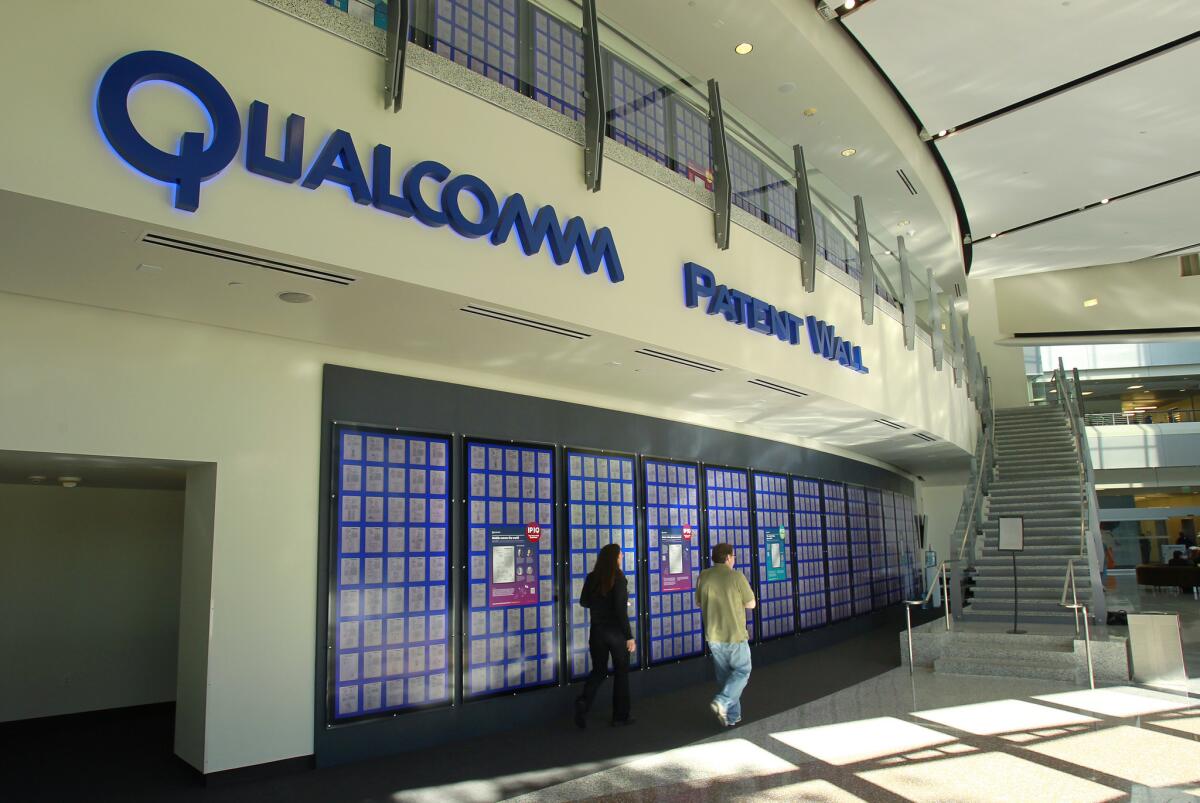Qualcomm wins reversal of antitrust verdict in its long-running battle with the FTC

- Share via
Qualcomm has won its appeal to overturn last year’s antitrust verdict in a case brought by the U.S. Federal Trade Commission, potentially ending a bitter saga that threatened the San Diego company’s lucrative patent licensing business.
A three-judge panel of the 9th Circuit Court of Appeals on Tuesday reversed U.S. District Judge Lucy Koh’s ruling last year that Qualcomm violated anti-monopoly laws in the way it licenses patents.
The panel also threw out Koh’s worldwide permanent injunction prohibiting Qualcomm from certain business practices, which could have reduced the company’s incentives to invest in next-generation wireless technologies such as 5G.
The 9th Circuit’s rejection of Koh’s ruling marks a victory for the way Qualcomm gets paid for investing in research and development, which came under attack in lawsuits brought by the FTC and Apple in early 2017.
Both claimed Qualcomm’s “no license, no chips” scheme allowed it to illegally leverage its market power in cellular chips to gain the upper hand in patent licensing negotiations with smartphone makers, forcing device makers to pay exorbitant royalties.
The FTC lawsuit, filed in the waning days of the Obama administration, was controversial. One FTC commissioner openly opposed the move, saying the case was based on a flawed legal theory. The U.S. Department of Justice, which also enforces anti-monopoly laws, sided with Qualcomm in both court filings and testimony before the 9th Circuit.
Apple settled with Qualcomm just as opening arguments began in a jury trial in April 2019. The two companies entered into multi-year patent licenses and chip supply agreements.
But the FTC case lingered as Koh pondered testimony following a 10-day trial in February 2019. In May of that year, Koh issued a sweeping, 300-plus page verdict in favor of the FTC.
Qualcomm appealed. When the 9th Circuit agreed to hear the case, it called Koh’s ruling either “a trailblazing application of the antitrust laws” or “an improper excursion beyond the outer limits of the Sherman Act.
“We now hold that the District Court went beyond the scope of the Sherman Act, and we reverse,” wrote Judge Consuelo Callahan, who authored the unanimous opinion.
Because the FTC’s lawsuit had the potential to create new antitrust precedents, legal experts believe the agency will strongly examine whether to appeal, possibly to the U.S. Supreme Court.
“The court’s ruling is disappointing, and we will be considering our options,” said Ian Conner, director of the FTC’s competition bureau, in a statement.
Qualcomm said the ruling vindicates its approach to licensing its wireless inventions.
“The Court of Appeals unanimous reversal, entirely vacating the District Court decision, validates our business model and patent licensing program and underscores the tremendous contributions that Qualcomm has made to the industry,” said General Counsel Don Rosenberg in a statement.
Patent royalties have been a leading driver of Qualcomm’s success in the smartphone era. They account for about 60% of the company’s profit and fund a significant portion of its research and development efforts.
Koh’s ruling threatened to dismantle Qualcomm’s licensing business model. So the 9th Circuit ruling Tuesday was a “decisive victory” for Qualcomm, said Bernstein Research analyst Stacy Rasgon.
“At this point, the last potential structural headwind against Qualcomm’s licensing business has now been dismissed,” Rasgon said.
Since the verdict, Qualcomm has worked to negotiate patent licenses with smartphone makers that would insulate the company in the event Koh’s ruling was upheld.
While those private agreements might have helped soften the blow, the 9th Circuit’s reversal puts the company’s business model on firmer ground, said Raymond James analyst Chris Caso.
“Qualcomm has now recently signed long-term license agreements with every major handset maker — Apple, Samsung, Huawei, LG, Oppo, Vivo, Xiaomi — and no longer has the overhang from the FTC case,” Caso said. “As such, we believe Qualcomm’s licensing revenue stream is more secure now than ever before.”
Qualcomm’s shares ended trading Tuesday up 2% at $108.83.







